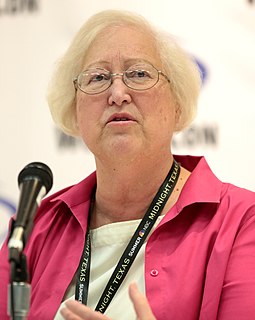A Quote by Connie Willis
Science fiction is an amazing literature: plot elements that you would think would be completely worn out by now keep changing into surprising new forms.
Related Quotes
I have always been intensely uncomfortable with the idea of a science fiction writer as prophet. Not that there haven't been science fiction writers who think of themselves as having some sort of prophetic role, but when I think of that, I always think of H.G. Wells - he would think of what was going to happen, and he would imagine how it would happen, and then he would create a fiction to illustrate the idea that he'd had. And no part of my process has ever resembled that at all.
The most watched programme on the BBC, after the news, is probably 'Doctor Who.' What has happened is that science fiction has been subsumed into modern literature. There are grandparents out there who speak Klingon, who are quite capable of holding down a job. No one would think twice now about a parallel universe.
I do think that science fiction ideas are best expressed through visual media like film and TV. Realist literature depicts things that we have seen in life, but science fiction is different: what it depicts exists only in the author's imagination. When it comes to science fiction, the written word is inadequate.
The literature now is so opaque to the average person that you couldn't take a science-fiction short story that's published now and turn it into a movie. There'd be way too much ground work you'd have to lay. It's OK to have detail and density, but if you rely on being a lifelong science-fiction fan to understand what the story is about, then it's not going to translate to a broader audience.
I worked out a book which I thought was just straight science fiction -- with everything pretty much explained, and suddenly I got an idea which I thought was kind of neat for working in a mythological angle. I'm really struggling with myself. It would probably be a better book if I include it, but on the other hand I don't always like to keep reverting to it. I think what I'm going to do is vary my output, do some straight science fiction and some straight fantasy that doesn't involve mythology, and composites.
Science fiction is the most important literature in the history of the world, because it's the history of ideas, the history of our civilization birthing itself. ...Science fiction is central to everything we've ever done, and people who make fun of science fiction writers don't know what they're talking about.




































